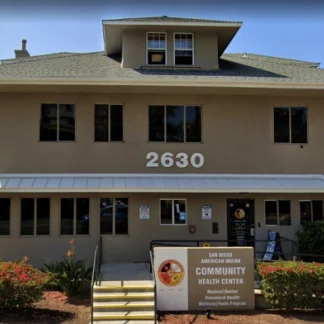Alvarado Parkway Institute Behavioral Health System Outpatient Services
Alvarado Parkway Institute Behavioral Health Systems Outpatient Treatment is loc...
The San Diego American Indian Health Center, located in San Diego, California, offers outpatient alcohol and drug rehab and behavioral health treatment to adults, adolescents, and children. They offer no-cost, culturally appropriate treatment to American Indians, including Talking Circles, Elders Circles, and more.
Outpatient treatment at the clinic is a combination of Western and Native American methodologies. Services include individual and group therapy, addiction education, life-skills training, and relapse prevention. Native American healing methods include Elder Blessings, Talking Circles, Smudging, and referrals to traditional healers.
Additional services offered by the clinic include connections to 12-step and other recovery programs, referrals to sober living, and connections to social services as needed by the client.
Services are free of charge to American Indians. For others, the San Diego American Indian Health Center accepts Medi-Cal and other insurance plans, which may include Humana, Aetna, Beacon, United Healthcare, Blue Cross Blue Shield, Cigna, and more. Insurance plans vary, so contact the insurer to verify coverage information and out-of-network benefits.
Contact us for more information: (619) 234-0648

Connect with San Diego American Indian Health Center by calling their admissions team directly.
(619) 234-0648 Website Get DirectionsWhether a marriage or other committed relationship, an intimate partnership is one of the most important aspects of a person's life. Drug and alcohol addiction affects both members of a couple in deep and meaningful ways, as does rehab and recovery. Couples therapy and other couples-focused treatment programs are significant parts of exploring triggers of addiction, as well as learning how to build healthy patterns to support ongoing sobriety.
Research clearly demonstrates that recovery is far more successful and sustainable when loved ones like family members participate in rehab and substance abuse treatment. Genetic factors may be at play when it comes to drug and alcohol addiction, as well as mental health issues. Family dynamics often play a critical role in addiction triggers, and if properly educated, family members can be a strong source of support when it comes to rehabilitation.
In individual therapy, a patient meets one-on-one with a trained psychologist or counselor. Therapy is a pivotal part of effective substance abuse treatment, as it often covers root causes of addiction, including challenges faced by the patient in their social, family, and work/school life.
Research clearly demonstrates that recovery is far more successful and sustainable when loved ones like family members participate in rehab and substance abuse treatment. Genetic factors may be at play when it comes to drug and alcohol addiction, as well as mental health issues. Family dynamics often play a critical role in addiction triggers, and if properly educated, family members can be a strong source of support when it comes to rehabilitation.
In individual therapy, a patient meets one-on-one with a trained psychologist or counselor. Therapy is a pivotal part of effective substance abuse treatment, as it often covers root causes of addiction, including challenges faced by the patient in their social, family, and work/school life.
In individual therapy, a patient meets one-on-one with a trained psychologist or counselor. Therapy is a pivotal part of effective substance abuse treatment, as it often covers root causes of addiction, including challenges faced by the patient in their social, family, and work/school life.
Alvarado Parkway Institute Behavioral Health Systems Outpatient Treatment is loc...
Dresher Street Sober Living, located in San Diego, California, is a sober living...
Located in the Mission Valley district of San Diego, California, VA San Diego He...
San Diego Center for Children - Armstrong Street, located in San Diego, Californ...